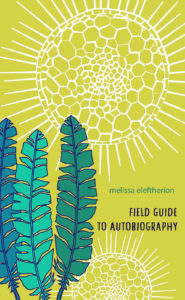 Review by Jennifer Martelli
Review by Jennifer Martelli
Field Guide to Autobiography is a mingling of sound, disintegration, and copulation, using the gorgeous Latinate language of insects and oceanic creatures, to reach this tragic and “absolute brightness” of life. The very title of the book hints at scientific nomenclature with a brilliant female voice. Melissa Eleftherion blurs the expectations and parameters of a book of poetry, also. The poems surprise with their flouting of poetic rules, as if the speaker is responding to an inner law, one that is generative, holy:
To become solemnly visible, gratification of the body
A curving, a fabric, tidal device a study of
Subatomic music the absolute brightness. (“erasiromotor” 13).
Eleftherion calls this music “subatomic witchcraft their tissues / in high frequency (“subatombotanies” 44)” It’s both generative and degenerative, as if the actual sounds of these scientific words give rise to the human. In “cuticle begins to open,” she writes
The crystals were wet skeleton music
Heliopause a magnet for larvae.
The lack. (62)
I loved the abandonment into the words, which seemed embedded in the DNA of the speaker.
In its daughter cells a rattle acapella All delirium of
decrees and doctrines fallen ridiculed phylum
Its bark and bone in the gristle of embrace
Rolled up like a thick cuticle (44)
Sound threatens to break apart structure on a macroscopic scale (society), and microscopically (the body). In “Rattle, esophagus waist,” a list poem, the mind yearns for a subject, a completion of thought, but is given just pieces of the whole:
Rattle, esophagus waist. Dewlap, forelimb. Popliteal fossa.
Eggtooth, climbcloaca. Anterior astogalus.
Kell, brain, keel. Hoof, patella. Auditory meatus. (11)
We are reminded that “this is an autobiography of fractures (“i made myself from rocks” 1).” Throughout the book, Eleftherion presents us with chasms and broken things, both in imagery and by the structure of the poem on the page. In “i give birth to myself,” she writes
The line in pieces
Gaps in the static
Botanica a hermetic
neutrino
Aurora born of glass (43)
She creates broken-ness on the line with her spacing and her language: gaps, pieces, static, a hermetic, glass. But, as devastating as this breaking might be, it is also a regenerative energy. It births sound, but it is also
shaped like a first-born child
The nucleus in animal salts
The splitting of the crown (“Phosphorescent Composition” 6)
Eleftherion focuses on the inherent tension around breaking: a painful necessity, or simply pain. A more tragic element in the book is Eleftherion’s conflation of this pain with commerce, be it financial or physical: “this is a group of soft bones breaking /this is a history of capitalism (“autobiography” 58).”
Just as sound and structure break and become one pile of shards, so does capitalism mingle with copulation. In “Hydra in Her Own Dust,” Eleftherion brings these themes together:
Scolding subcutaneous birds cavity a rubbing of soft bones
Scabs carapace vibrissa meat capitalism petroleum handjobs
a tiny Echinodermata
A colony of salts Dust copulatory (63)
Eleftherion explores the business of sex–medically, emotionally, and financially; she looks unflinchingly at this cost to the female body. In “sexually active,” she writes
Working girls get the butter
an inedible sea wall
Echolocates the rasp
. . . . . . . . . . . .
Mouths multitask
The ultrasound
A beam of genital strategies (35)
In one of her heart-breaking poems that deal with abortion, Eleftherion returns to sound. In “my aborted fetus Coney Island Circus Sideshow,” she writes
the yolk demands its attachment
the yolk broadcasts the feed
. . . . . . . . . . . .
the fight is feather distance but we claw its shimmer of idea
A hologram that pops up strata with puffed chins and chest
A high squealing of wah wah wah (38)
Throughout Field Guide to Autobiography, I could hear the “underground rhizome of chirping, abolishing (“wilderness meat a feathered breathing” 39).” This rootstalk kept me rapt, enthralled in a book about shattered things and the sounds that grow from that shattering. With language as dense as Lucie Brock-Broido’s and as lethally specific as Emily Dickinson’s, Melissa Eleftherion creates a “steel reverb,” and demands that we listen. Eleftherion states, “When home disintegrates / we belong everywhere . . . .Come find me.” Field Guide to Autobiography is like a kaleidoscope of shattered glass and sound, one bought at a carnival. It is a book to be read over and over for a different view, each time.
Field Guide to Autobiography
by Melissa Eleftherion
H_NGM_N BKS, 2017, 15.95 [Paper]
ISBN 978099432212
Listen to Melissa Eleftherion Carr read “subatombotanies” from Field Guide to Autobiography.
Jennifer Martelli’s debut poetry collection, The Uncanny Valley, was published in 2016 by Big Table Publishing Company. She is also the author of the chapbook, Apostrophe and the chapbook, After Bird, from Grey Book Press. Her work has appeared in Thrush, [Pank], Glass Poetry Journal, The Heavy Feather Review, and Tinderbox Poetry Journal. Jennifer Martelli has been nominated for Pushcart and Best of the Net Prizes and is the recipient of the Massachusetts Cultural Council Grant in Poetry. She is a book reviewer for Up the Staircase Quarterly, as well as a co-curator for Mom Egg Review online, MER VOX.
